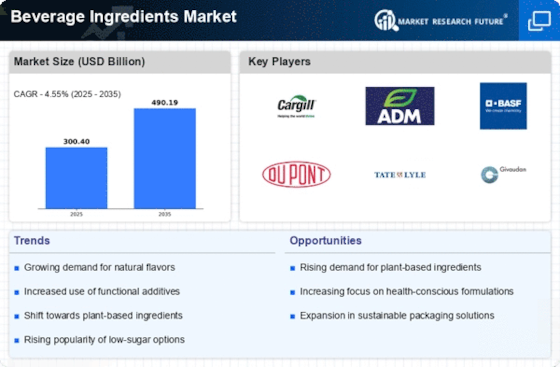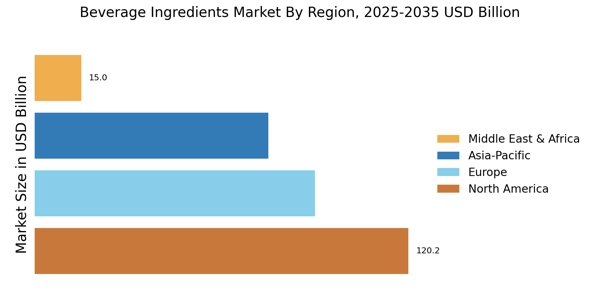Focus on Clean Label Products
The focus on clean label products is becoming increasingly prominent within the Beverage Ingredients Market. Consumers are demanding transparency regarding the ingredients used in their beverages, leading to a preference for products with minimal processing and recognizable components. This trend is reflected in the growing market for clean label beverages, which is projected to expand at a rate of around 7% annually. Manufacturers are responding by reformulating their products to eliminate artificial additives and preservatives, opting instead for natural and organic ingredients. This shift not only aligns with consumer preferences but also enhances brand credibility and trust. As the clean label movement continues to gain momentum, the Beverage Ingredients Market is likely to see a significant transformation, with an emphasis on ingredient integrity and authenticity.
Innovation in Flavor Profiles
Innovation in flavor profiles is a significant driver within the beverage ingredients Market. As consumer preferences evolve, there is a growing appetite for unique and exotic flavors that enhance the overall drinking experience. Beverage manufacturers are increasingly experimenting with diverse flavor combinations, including botanical extracts, spices, and fruit blends. This trend is supported by market data indicating that the flavoring agents segment is expected to witness substantial growth, with a projected increase of around 6% annually. The introduction of novel flavors not only attracts consumers but also encourages brand loyalty, as customers seek out distinctive taste experiences. Consequently, the Beverage Ingredients Market is likely to see a surge in demand for innovative flavoring solutions, prompting suppliers to invest in research and development to meet these changing consumer expectations.
Rise of Plant-Based Ingredients
The rise of plant-based ingredients is reshaping the Beverage Ingredients Market. As consumers become more environmentally conscious and health-oriented, there is a marked shift towards plant-based beverages. Ingredients such as almond milk, oat milk, and various plant extracts are gaining traction, appealing to both vegan and non-vegan consumers alike. Recent statistics suggest that the plant-based beverage segment is anticipated to grow at a rate of approximately 10% per year. This trend is not only driven by dietary preferences but also by a growing awareness of the environmental impact of animal-based products. As a result, beverage manufacturers are increasingly incorporating plant-based ingredients into their formulations, thereby expanding the Beverage Ingredients Market and catering to a broader audience seeking sustainable and healthful options.
Technological Advancements in Production
Technological advancements in production processes are significantly influencing the Beverage Ingredients Market. Innovations such as high-pressure processing, microencapsulation, and fermentation technology are enhancing the efficiency and quality of beverage production. These technologies enable manufacturers to preserve the nutritional value of ingredients while extending shelf life and improving flavor profiles. Market analysis indicates that the adoption of advanced production techniques is expected to increase by approximately 15% over the next few years. This shift not only streamlines operations but also allows for the incorporation of more complex and healthful ingredients into beverages. As technology continues to evolve, the Beverage Ingredients Market is likely to benefit from enhanced product offerings and improved consumer satisfaction, ultimately driving growth in the sector.
Increasing Demand for Health-Conscious Products
The Beverage Ingredients Market is experiencing a notable shift towards health-conscious products. Consumers are increasingly seeking beverages that offer health benefits, such as enhanced hydration, improved digestion, and immune support. This trend is reflected in the rising popularity of functional ingredients like probiotics, vitamins, and minerals. According to recent data, the market for functional beverages is projected to grow at a compound annual growth rate of approximately 8% over the next five years. This demand for health-oriented beverages is driving manufacturers to innovate and reformulate their products, thereby expanding the Beverage Ingredients Market. As consumers become more aware of the nutritional content of their beverages, the emphasis on health-promoting ingredients is likely to persist, shaping the future landscape of the industry.

















